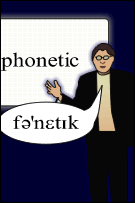The International Phonetic Alphabet
Created | Updated Sep 22, 2005

The International Phonetic Alphabet1 (IPA) is a system of transcription used in linguistics to represent in writing the many and various sounds produced in human speech. Although several such systems have been devised, the most widely accepted internationally is the one that was published in 1888 by a group of French linguists called the Association Phonétique Internationale, (International Phonetic Association). The creation of such a system appears first to have been suggested by Otto Jespersen to Paul Passy, a founding member of that group. The system published by Passy and his colleagues in 1888 was based on earlier similar efforts, particularly a system for the transcription of English published by Isaac Pitman and Henry Ellis in 1847. The 1888 IPA (and the 'International' nature of that system is the key difference) has been somewhat revised since its first publication, particularly at the 1989 IPA Kiel Convention, but has largely stood the test of time and been widely accepted and used in the field of linguistics. There is some debate as to how truly international it is, and in the United States some variations are commonly used. It might also be said that it has not been as universally recognised beyond academic spheres as its creators might have hoped.
What is a Phonetic Script?
The individual sounds of human languages are called phonemes in linguistics. A phoneme can be defined as 'a distinct unit of sound' or 'the smallest unit of speech distinguishing one word (or word element) from another'. Think of the 'd' sound in dog. It is not 'tog' or 'bog' because they begin with different phonemes. In linguistics phonemes can be annotated /d/ as compared to /t/ or /b/. Although one might simply say that these examples begin with a different letter, it is not true that all phonemes are interchangeable with letters.
For one thing, the IPA uses a single symbol to represent what in English, for example, may require two 'letters' ('th', 'sh', etc). Also, no single language uses all the different sounds that are used in speech worldwide. Furthermore, not all languages use the same alphabet 2 , any alphabet, or indeed, are written down at all. The IPA encompasses all these sounds and includes additional specific notation marks, called diacritics, to represent fine distinctions in consonant sounds and to show nasalisation, length, stress, and tones of vowels. A single 'phoneme' may have one or more variants in the way that it is articulated, depending on its position in a word within an individual language, for instance. Diacritical marks enable linguists to show these distinctions.
When is it Used?
The main use of the IPA today is in the study of linguistics, where it is of great value to be able to write down very precisely how sounds are pronounced by native speakers, especially of newly discovered or disappearing languages. It is used in some dictionaries to indicate the pronunciation of words, although most standard English dictionaries use a simplified version because few people are familiar with the symbols, making them useless to many dictionary users. As an illustration, compare the IPA transcription of 'association' in the second 'title' of the IPA page linked below, with the pronunciation given in your favourite dictionary.
The IPA has (more rarely) been used to transcribe languages that had never previously been written down at all. It can also be used in language textbooks and/or phrase books to represent the pronunciation of foreign languages, especially those that use non-latin alphabets, such as Russian, or more radically Chinese or Japanese pictograms. It can be imagined how this might also be useful to those learning English as a foreign language, for which English spelling can often be frankly misleading.

